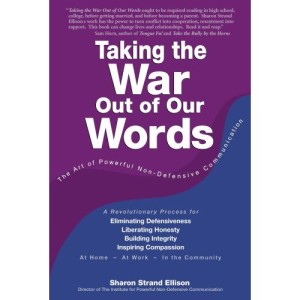Powerful Non-Defensive Communication (PNDC) is a style of communication developed by Sharon Stand Ellison. Sharon believes the traditional method of communication – what she calls the “war model” – increases conflict because the focus is on winning the argument rather than resolving the issue. To the contrary, PNDC is honest, open communication that focuses on avoiding defensive maneuvers and power struggles that fuel conflict.
Communication under the “war model” leads to defensive reactions. Scientific research shows that when defensive, our limbic system is activated. This is the emotional part of the brain that controls the “fight or flight” response. With the limbic system engaged, a person reacts instinctively, not rationally. This diminishes, and may even temporarily eliminate, the ability to effectively communicate. Once stimulated, the limbic system remains activated for 20 minutes to 1 hour. This is one reason why it may seem impossible at times to move past an argument and resolve the conflict.
Once defensive, Sharon believes we engage in power struggles as part of the “fight or flight” response. Sometimes when faced with conflict, a person withdraws or surrenders. However, appearing weak or vulnerable is generally against human nature, as this leaves open the opportunity to be attacked and hurt. The remaining option is to search for the other person’s weakness and vulnerabilities, and counterattack. While engaging in defensive tactics (surrender, withdraw, or counterattack), effective communication is prevented.
Sharon’s solution: avoid defensiveness and power struggles through PNDC. She explains PNDC requires a person to “(1) change key attitudes, and (2) shift how we ask questions; give feedback; express our own thoughts, feelings and beliefs; and create clear boundaries. These shifts include changes in (a) intention, (b) tone, (c) body language, and (d) formatting (phrasing).” Here are some examples of how defensive communication differs from positive non-defense communication.
With PNDC couples can minimize conflict and reach a level of deeper understanding. Examples of the skills taught are:
- Speaking in a way that prevents others from becoming defensive.
- Preventing yourself from responding defensively to others.
- Stating opinions without superiority, criticism, or persuasion.
- Setting limits without coercion or ultimatums.
Sharon’s book, Taking the War Out of Our Words, a how-to guide on using PNDC. She also offers conferences for couples and for the mediators who work with them.

